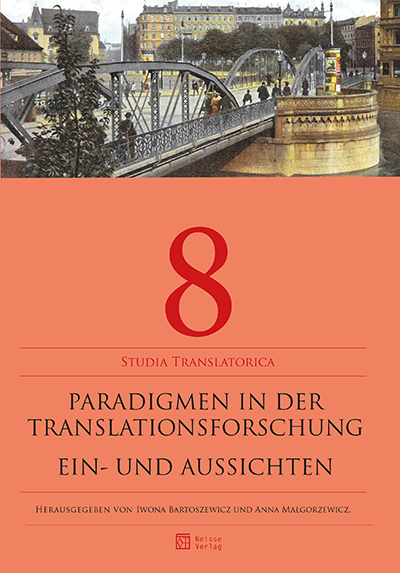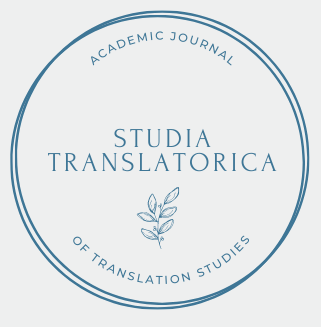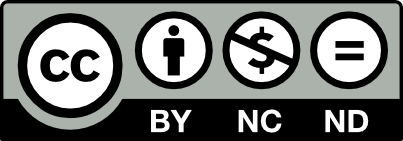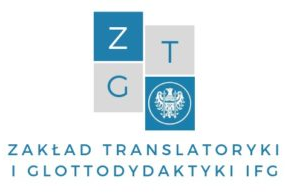
Studia Translatorica
Numer 8 (2017): Paradigmen in der Translationsforschung. Ein- und Aussichten
Redakcja: Iwona Bartoszewicz, Anna Małgorzewicz
Die anthropozentrische Translatorik von F. Grucza. Skizze der paradigmatischen Evolution einer Disziplin / The conception of anthropocentric translatorics by F. Grucza: An approach to presenting a paradigmatic evolution of a scientific discipline
DOI: 10.23817/strans.8-1 (data publikacji online: 2020-01-15)
Słowa kluczowe: the anthropocentric conception of translation, the cognitive and practical competences of a translator, the relationship of translation as a system of constituencies for any situation of translation, primary sender – source text – translator as a secondary recipient and as a secondary sender – target text – terminal (final) recipient, the relationship of translation as a relationship of communication
The article outlines, evaluates and gives a special review of the development of the paradigm which founded the conception of anthropocentric translatorics formulated by F. Grucza. In this way, the author of the new theory and the new scientific discipline has opened a new perspective on translation by establishing the complete relationship between the constituencies within this fundamental constellation of every translation situation. The translator as a human being has been situated in the centre of the relationship of translation and defined as the subject of any cognitively and communicatively oriented translation activity. Thanks to this anthropocentric approach (as a different option) anthropocentric translation studies started to be treated as an autonomous scientific discipline. The main goal of the anthropocentric translatorics (known also as translatology) consists in reconstructing of special features of the central object (which are the translators themselves) performing the main translation operations like re-profiling, re-contextualisation, re-addressing. The very reconstruction concerns skills within the translator’s competence determined by other translation operations. The didactics of translation has to be based and profiled upon the above characterised constituencies of the translator’s competence which depend on the type/kind of translation.
Zur Relativierung des Textbegriffs in der Übersetzung der medialen Ära / About the relativisation of the approach to text in translation in the media era
DOI: 10.23817/strans.8-2 (data publikacji online: 2020-01-15)
Słowa kluczowe: translation, intertextuality, polysystem, interculturality, interculture
The article concerns the problem of changes within the linguistic approach to text from the perspective of the new multimedia surrounding of texts and the influence of the interfactors on the translation process itself. The factors on which the approach has been created are partially well known: intertextuality, intersemioticity, interculturality, and indexicality. The main role fulfills in the approach the term interculture understood as a knowledge domain around primary texts according to Even-Zohar’s polysystem theory.
Übersetzen, (Un)Treue und Geschlechterrollen in einer Kurzgeschichte von Moacyr Scliar / Translation, (in)fidelity and gendering in a short-story by Moacyr Scliar
DOI: 10.23817/strans.8-3 (data publikacji online: 2020-01-15)
Słowa kluczowe: literary translation, gendering, authorship, belles infidèles
Common sense has often associated both translations and translators with different forms of betrayal. In this paper I intend to focus on how the theme of betrayal in translation is treated in terms of a love triangle, in which the translator’s “unreliable” handling of the original is associated with some form of competition with the author for the love of a woman. The object of my analysis will be a short story by Moacyr Scliar entitled “Notas ao Pé da Página”, first published in Brazil in 1995. I believe that such an analysis may help us further understand the often negative reputation translators seem to have in a culture that worships originals and tends to distrust any activity that somehow “touches” them. It may also help us reflect on why mainstream translation theories have always been so interested in controlling and disciplining translators and their interventions in the texts they necessarily have to rewrite.
Of world literature and challenges in translation: An intercultural perspective / Of world literature and challenges in translation: An intercultural perspective
DOI: 10.23817/strans.8-4 (data publikacji online: 2020-01-15)
Słowa kluczowe: translation, relevance theory, cultural dimensions, good translation, world literature and intercultural patterns
The paper investigates the manner in which translation of intercultural patterns affect the association between Krishna Sobti’s Dilo Daanish, the source text (Hindi) and The Heart has its Reasons, by Reema Anand and Meenakshi Swami, the translated text (English) within a Relevance Theoretic framework. Discussing this concept of fidelity with regards to cultural dimensions the paper will try to explore the significance of Intercultural Patterns and their applicability in the context of World Literature. Using, Sperber and Wilson’s (1995, 2002) Relevance Theory, a theory efficacious in the domain of translation, and Jens Allwood’s (1985) Intercultural Patterns, the study attempts to establish how the percolation of a particular pattern during the translation process achieves and maintains the cultural system within a text. Thereby promoting the notion of an adequate translation.
Zwischen Ausgangs- und Zieltext: Multidimensionalität der prozess- und resultatorientierten Übersetzungskritik und ihrer Kriterien / Between source and target text: multidimensionality of process- and result-oriented translation evaluation and its criteria
DOI: 10.23817/strans.8-5 (data publikacji online: 2020-01-15)
Słowa kluczowe: source text, target text, translation evaluation, evaluation criteria
The article focuses on the relations between a source and a target text with regard to their relevance for the evaluation of written translations. Furthermore, the paper presents the concepts of translation evaluation introduced by Nord, Koller, House, and Reiss. The present paper discusses phases of the evaluation process as well as their connections to the translation process. The focus is also placed on evaluation criteria which are an indispensable condition for clear and comprehensible evaluation of translations.
The semiotic cohesion of audiovisual texts. Types of intersemiotic explicitations in the English subtitles of Japanese full-length films / The semiotic cohesion of audiovisual texts. Types of intersemiotic explicitations in the English subtitles of Japanese full-length films
DOI: 10.23817/strans.8-6 (data publikacji online: 2020-01-15)
Słowa kluczowe: audiovisual translation, intersemiotic specification, semiotic cohesion, Japanese-Italian interlinguistic subtitling, source text and target text intercultural relation
This study intends to address the following questions from the perspective of audiovisual translation studies: how can extraverbal elements of multimodal texts be represented within subtitling? What strategies can be implemented to facilitate the interlinguistic mediation of feature films subtitled into English from non-European languages without significant phenomena of anchoring and redundancy?
Materia Magica im Übersetzungsverfahren. Hyperphysionyme und Methoden ihrer Übersetzung / Materia Magica within the translation process: Hyperphysionyms and methods of their translation
DOI: 10.23817/strans.8-7 (data publikacji online: 2020-01-15)
Słowa kluczowe: translation techniques, game studies, onomastics
The following article discusses the translation problems of a specific kind of lexical units, the hyperphysionyms, which have been defined as the names given to different science-fiction and fantasy creatures. The main concerns of this paper are translation possibilities of personified hyperphysionyms and descriptive hyperphysionyms.
Militäranspielungen als (audio)visuelle Witze in „How I Met Your Mother“ / Military references as (audio)visual jokes in “How I Met Your Mother”
DOI: 10.23817/strans.8-8 (data publikacji online: 2020-01-15)
Słowa kluczowe: audiovisual translation, visual jokes, sitcoms, complementarity
The purpose of this paper is to analyse a particular type of jokes made in the US-American sitcom How I Met Your Mother and their official TV translations into Polish and German. The examples encompass private jokes shared by two main characters, Ted and Robin. Those are military-oriented visual jokes that are expressed partially verbally and partially visually. The first section of the paper discusses the character of audiovisual works and the relation between the visual and acoustic channel. The second part describes chosen joke typologies. What follows is the analysis of jokes in source and target languages.
Politeness in subtitling: To retain or not to / Politeness in subtitling: To retain or not to
DOI: 10.23817/strans.8-9 (data publikacji online: 2020-01-15)
Słowa kluczowe: politeness, address, self-denigration, non-verbal politeness
This paper explores how politeness-related terms in Chinese films are translated into English with a case study that consists of four of Zhang Yimou’s films. Zhang Yimou is allegedly the most internationally acclaimed Chinese director. The selected films are set in different time periods of China, and thus politeness is manifested with different focuses. Politeness in the films follows two maxims: Address Maxim and Self-denigration Maxim. Hence, this paper will examine how those politeness-related terms fall into address and self-denigration divisions and how they have been translated by subtitlers. As visual politeness is prevalent in audiovisual productions, this paper will also briefly analyse how Chinese politeness is demonstrated non-verbally.
Nikos Kazantzakis’s Work under the Romanian Censorship’s Siege / Nikos Kazantzakis’s Work under the Romanian Censorship’s Siege
DOI: 10.23817/strans.8-10 (data publikacji online: 2020-01-15)
Słowa kluczowe: Censorship, literary translation, comparative analysis
This article presents several observations regarding the way the Romanian Communist Censorship affected the editorial field, in general, and the literary translation, in particular. Therefore, I will provide a comparative analysis of the translations into Romanian of two works belonging to Nikos Kazantzakis, Ο Χριστός ξανασταυρώνεται (“Christ Recrucified”) and Αναφορά στον Γκρέκο (“Report to Greco”), performed firstly in 1968 and in 1986, and retranslated after 1989.
Marginalizing Lin Shu in the Republican Era: Language styles, Henry VI, and translation / Marginalizing Lin Shu in the Republican Era: Language styles, Henry VI, and translation
DOI: 10.23817/strans.8-11 (data publikacji online: 2020-01-15)
Słowa kluczowe: marginalization, Lin Shu, language styles, Henry VI, translation
Lin Shu quickly appeared but vanished in Chinese literary history at the turn of the twentieth century. Following a sociohistorical path, this essay identifies three roles he played in a particular context: an ancient-style prose defender, a loyal servant to the Qing Court, and a once popular translator. Each discussion sheds light on a different aspect of Lin’s marginalization. Merged together they may clarify the complexity and the contradictions of the considerations taken by him when translating. My basic claim is that Lin was not simply entangled in the debates on language styles or blindly obedient to the Qing Court, but truly worried about the root of Chinese culture. Through responding to some of his supposed faults, I want to allow him to reclaim his well-deserved place in the pantheon of Chinese literature.
Het vreemde in vertaling: een policonfrontatieve analyse van realia in de vertaling van De donkere kamer van Damokles naar het Duits en Pools / The foreign in translation: A polyconfrontative analysis of realia in the translation of De donkere kamer van Damokles into German and Polish
DOI: 10.23817/strans.8-12 (data publikacji online: 2020-01-15)
Słowa kluczowe: foreignness, realia, culture-specific elements, translation strategy
This article discusses the translation of culture-specific elements that can be seen as potential carriers of foreignness. For this purpose, Willem Frederik Hermans’s novel De donkere kamer van Damokles along with its translations into German and Polish are being scrutinised. The translations into German by Waltraud Hüsmert and into Polish by Andrzej Dąbrówka are taken into account. The analysis seeks to outline which translation techniques were used to represent the culture-specific elements in the target languages. Consequently, it will be possible to indicate a tendency with regard to the translation strategies that were applied.
Zur Relation zwischen der textuellen und subjektiven Unübersetzbarkeit in der interlingualen Kommunikation am Beispiel des Gedichtes von Urszula Kozioł Nadnagość und seiner deutschen Übersetzung / Textual and subjective untranslatability in intercultural communication as illustrated by Urszula Kozioł’s poem “Nadnagość” and its German rendition
DOI: 10.23817/strans.8-13 (data publikacji online: 2020-01-15)
Słowa kluczowe: untranslatability, translation, poetry
In the following article, the author describes some problems arising from translation of some Polish verbs which provide readers with information about the gender of the speaker and the addressee. Lesner focuses his attention on referential meaning as well as on content and connotative structure of the poem and its German rendition.
Realienlexeme in der literarischen Übersetzung / Realia in literary translation
DOI: 10.23817/strans.8-14 (data publikacji online: 2020-01-15)
Słowa kluczowe: cultural references in literary translation, realia, translation techniques, translator’s creativity
The paper is devoted to the discussion of selected cultural aspects of literary translation. The subject matter of the paper is the description of the strategies taken by Zbigniew Krawczykowski and Józef Mirski in their translations of the best-known Heinrich von Kleist’s comedy Der zerbrochene Krug into Polish. The author touches upon the issue of translatability of the cultural references in the form of realia. The specific translation endeavours are analysed on the basis of the examples in the work under study.
Wenn Knarren zu Gespielinnen werden: Zu translatorischen Defiziten denotativer Natur in der polnischen Übersetzung von Rolf Schneiders Roman „Die Reise nach Jarosław“ / When guns turn into sweethearts: Discussing translation shortcomings of denotative type in the Polish translation of the novel “Die Reise nach Jarosław” by Rolf Schneider
DOI: 10.23817/strans.8-15 (data publikacji online: 2020-01-15)
Słowa kluczowe: literary translation, denotative equivalence, translation error, German, Polish
The paper presented here deals with three different types of translation inadequacy at the denotative level identified by the author in the Polish translation of the novel Die Reise nach Jarosław by Rolf Schneider. To start with, the background of the novel and some specific aspects of its language are briefly described. Then, each type of shortcomings, i.e. false (or inaccurate) substitution, omission and addition, is discussed on the basis of several illustrative examples and the conclusion is drawn that virtually all translation errors recognised in the target text could easily have been avoided. In most cases they are due not to unintentional misinterpretation of a source language unit by the translator but rather to his general treatment of the original text which has to be judged as clearly too negligent.
Lebedewa, Jekatherina (Hg.) (2016): Tabu und Übersetzung (Ost-West-Express. Kultur und Übersetzung. Band 26) Berlin: Frank & Timme. 248 S.
DOI: 10.23817/strans.8-16 (data publikacji online: 2020-01-15)
Słowa kluczowe:
De Rosa, Gian Luigi/ Bianchi, Francesca/ De Laurentiis, Antonella/ Perego, Elisa (Hg.) (2014): Translating Humour in Audiovisual Texts. Bern et al.: Peter Lang. 533 S.
DOI: 10.23817/strans.8-17 (data publikacji online: 2020-01-15)
Słowa kluczowe:
Kozłowska, Zofia/ Szczęsny, Anna (2018): Tłumaczenie pisemne na język polski. Kompendium.Warszawa: PWN. 294 S.
DOI: 10.23817/strans.8-18 (data publikacji online: 2020-01-15)
Słowa kluczowe:
Zybatow, Lew N./ Petrova, Alena/ Stauder, Andy/ Ustaszewski, Michael (Hg.) (2017): Übersetzen und Dolmetschen: Berufsbilder, Arbeitsfelder, Ausbildung. Ein- und Ausblicke in ein sich wandelndes Berufsfeld der Zukunft. 70 Jahre Innsbrucker Institut für Translationswissenschaft. (Forum Translationswissenschaft Band 21) Frankfurt am Main: Peter Lang. 310 S.
DOI: 10.23817/strans.8-19 (data publikacji online: 2020-01-15)
Słowa kluczowe:
Kubaszczyk, Joanna (2016): Faktura oryginału i przekładu. O przekładzie tekstów literackich. Warszawa. PWN. 274 S.
DOI: 10.23817/strans.8-20 (data publikacji online: 2020-01-15)
Słowa kluczowe:


